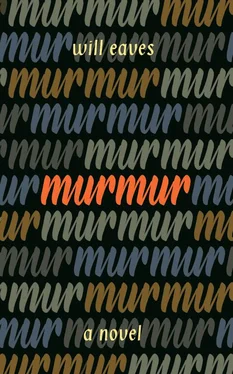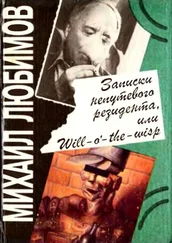A droplet from the ceiling of the cave and a lid falling shut. The key turned in a secretaire or jeweler’s box. Winter, a circuit diagram of trees; and winter fairs, the times we are wanton, where everything that happens has a wild intensity— that child sliding across the ice, that gaff lad fucking in the chairoplane’s paybox—which riot repeats itself in rides and roundabouts that from a distance whir faintly, their sound receding like the mechanism of a buried watch.
*
I do remember who they are.
Trentham exclaims: “It’s good to have you back!” And I say, yes, it’s good. An understatement there. The words are thick but definite. Good to be back. We laugh. I know these people are around me and it seems I’m responding, but at the same time I’m in here, in Pryor’s room, and this is where I feel myself to be. I hear their world. I cannot see how to communicate with it. The room’s walls tent inward, billow like balloon silk with every word that’s said by us—Trentham, June, me.
The doctor, for his part, is calm. His words walk down the corridor of the mirror: hard-shoe can-can’ts marking the limits of responsibility.
“I understand you’re going to the fair on the way home. That’s good. Well, take it easy but enjoy yourselves!” The walls inflate, and he and June confirm something. “Oh, work can wait… of course… of course, to watch… no, no, I can’t see any reason why he shouldn’t, why you shouldn’t, just as long as it’s not too busy or loud. Stick to the stalls, maybe? See what the noise is like. And not too long.” And June agrees, no, not too long, and I say, don’t worry, and, if I will, I can .
The words come out the wrong way round. They understand.
I blink, open my eyes, and they’re all there, as you’d expect: June, flushed with terrible relief, holding herself, thinking despite the smile, “God knows what this has done to us, our unborn child.” Trentham thin, curved, a standard lamp. I’m on a bed with cot edges and I can smell the jug of water, wilting flowers, the tracery of cords and wires attached to me, the warm plastic of monitor casings.
A wheelchair waits, hangdog and empty-mouthed.
But then I close my eyes and open them again and I am in the room behind the room, the window darker, giving onto backs at King’s in which the long shadows of medieval fairs flicker, the trade in salt and fish, samphire, the roasting spits, the leather and the wool merchants. None of this fantasy, none of the objects in this inner room are memories or perceptions. They’re neither past nor present, yet they form a kind of boundary. They’re states of mind and real appearances and as I think of them they come closer, a book of mathematical puzzles next to the horrible pupa, still growing in the yellow afternoon; a letter from a physics schoolmaster who says he very much enjoyed my radio broadcast, and that the rub in teaching computers to “think” is getting them to recognize a new relationship…
The strange veracity of these impressions seems to constitute a mood. Moods are like fields of force—ungraspable and everywhere. They permeate the whole of consciousness and color it, though they are never it .
Whatever it is, it is frightening, with bellyings in the silken walls that stiffen suddenly into mainsails as I consider where and when I am, the date, the location. I have a hollow, dropped feeling that’s manifested in the room—the mirror tilts, the newly lighted Trentham lamp falls over on its bulb, the long green lawn outside the window moves. The eel develops limbs and teeth and turns into a baby alligator, stuffed, in a vitrine. I am a gypsy in a caravan of curiosities.
They’ve put me in the chair, that’s what it is.
They’ve driven me across the city to the Fair, and my reactions—to the cold, the autumn reds—are plausible. I see them flexing in the depths of the pupa, fattened and growling now, a womb of pulverized grub-thoughts and biomimicry.
“Alec,” June says, “we won’t go right into the Fair, it’s just too loud and dangerous, but we can get up close and smell the candyfloss. The horrible burgers, you know.”
Trentham admits he can’t see the attraction, but he’s baffled by such things because they’re eccentric, a taste set free. And June agrees with him and for a moment pennies drop, in some mental roulette, because they’re treating me as if I’ve gone away or been exchanged and will not ever really understand again. Perhaps it’s for the best. They do not look too long at me. They will be married when I’m gone.
I say, oh yes. I point across the common to the angling pond, the cars and transit vans along the old rat-run, fishers like cut-price Rodin figurines, and couriers having a nap, some of them sleeping overnight and waking to a carless dawn, the goblet hornbeams leading down a common path to views of Battersea.
*
The Station’s chimneys churn out huge white clouds that everyone ignores. The dream of reason generates such silent but immense power!
My fallen body is at one Fair—Clapham Common—in the early years of our century, the twenty-first and last, and slowly answering questions, admiring sights. The rides are astronomical—Meteor, Vortex, Gravity. They tip their human cargo upside down and tumble it safely; behind the music there’s parental boredom, not just from the parents on the rides but from the rides themselves. They seem to pant between journeys that go nowhere, swinging and swaying slightly, like a father giving piggybacks, as children scramble on and off. Both Trentham and my wife are sure the atmosphere has changed over the years. No one takes money on the rides; you buy tokens. There are far fewer gaff lads from reformatories working the grounds, seducing girls, tapping up customers. June says it’s so impersonal-looking, these days, no one-arm bandits, no toy stalls with quoits and bagged-up goldfish for prizes.
We’re on the outside of the fence, a sectioned chain-link shield with warnings about dogs and thievery. Inside, unlikely things happen. Some people have a rotten time and others fall in love. I love the light rain and the smell of chips, the way I’m free to shrink away from the edges.
I miss my mother terribly. I miss my other selves I took for granted, youth and bravery. I know with certainty that when I see people in dreams—people I’ve never met whom I know to be close friends—my mind is not playing a trick, it’s sorting possibilities. I hear myself say, “Just imagine how it used to be.”
June looks at me, trying to understand, impenetrably furious.
My inner eye and person, in retreat from whatever the hospital has done to me, have cycled down the road and back in time. Together we take turns about the Pleasure Gardens in the spring of 1951. So much to choose from, such license! Battersea Fun Fair’s jangling rhythms and screams!
It seems, at first sight, from the painted rides, the shies and shows and girls watching the gaff lads walk on moving platforms like young gods, that this is what a fair has always been for laborers, ex-servicemen, the working class: a spell. Those with the time and money to imagine a future are elsewhere at the Festival of Britain on the South Bank, looking at pavilions and colored banners and displays of Land, People, and Home Design. Churchill said privately that he was rather bored by it. As if it’s that simple. The progressives and atavists are aspects of the same person and ghost each other like the showman’s wife who does accounts and runs a booth and even plays the Woman with a Bat’s Body when Josephine (who used to be a freak but wants to be a teacher) has her mathematics class in Lambeth North.
We’re here and we’re not here, the survivors of war and injury, seeking some primal recompense, the mood of innocence, horror, and glee that comes from being what you are, a filled-out shape making the most of it.
Читать дальше












